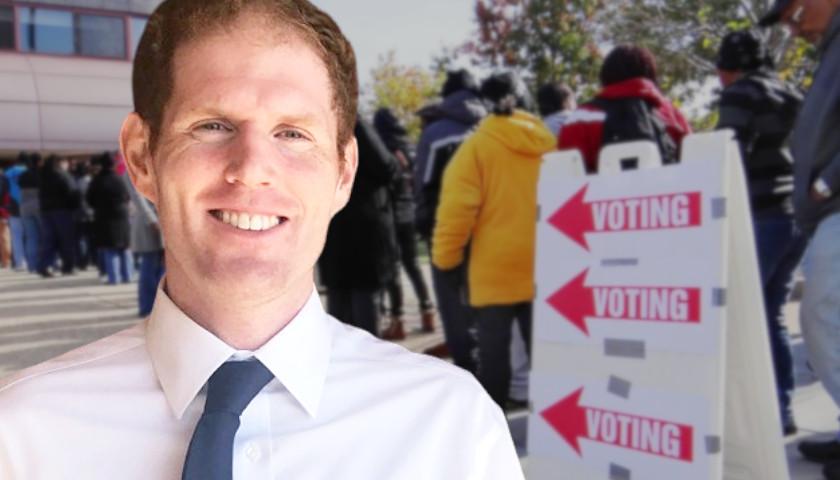Maricopa County Recorder Stephen Richer faces reelection, going up against two primary opponents and a Democratic challenger. Conservatives are furious at his denials that there was significant wrongdoing in the 2020 and 2022 elections, but he may lose reelection based on merely long lines and voting complications, which frustrated voters.
Voters encountered problems casting their ballots at 70 of the 223 vote centers in Maricopa County on Election Day in 2022, resulting in long lines and concerns that ballots were not tabulated or misread.
State Representative Justin Heap (R-Mesa), considered the more formidable challenger of the two Republicans challenging Richer (pictured above), said 300,000 Republican voters were disenfranchised in that election.
“It is clear that the incompetence of our current county recorder contributes to the belief among all of our voters that things aren’t on the up and up,” he said during a press conference announcing his candidacy in late February. “[T]he issue we have is in the last election, 300,000 active Republican voters did not mail in their ballot and did not vote on Election Day.”
In November 2016, the Associated Press reported, “Phoenix Election Official Dumped for Long Voter Lines.” Then-Maricopa County Recorder Helen Purcell, who’d held the job since 1988, lost the race to Democratic challenger Adrian Fontes. No one had ever challenged her reelection until that year when the problems surfaced.
Purcell chose to reduce the number of polling locations for the 2016 Presidential Preference Election to cut costs, something she was known for as a fiscal conservative. In 2008, there were 400 polling locations in the county. That dropped to 200 in 2012 and 80 in 2016, an 85 percent decrease overall.
Some candidates and their supporters launched an extensive campaign in 2016 to encourage people to show up and vote, but they failed to mention that independents were not allowed to vote. Independents flooded the polls, lengthening the lines, only to be told they could not vote since the primary was only for members of parties that were running a candidate.
The problem was made worse by state law requiring election workers to provide someone with a provisional ballot even if they are not eligible to vote. Explaining provisional ballots to voters takes extra time, in addition to the time it takes to fill out a ballot and cast it. Out of 24,000 provisional ballots cast in that election, 18,000 were from independents. Many of them were enticed to come out and vote since Donald Trump was on the ballot. Bernie Sanders was also running that year in the Democratic primary.
As a result, many voters waited in lines for up to five hours. Representative Greg Stanton (D-AZ-04), who was mayor of Phoenix at the time, asked the Department of Justice for an investigation. He said it had created “a culture of voter disenfranchisement.” Then-Governor Doug Ducey said the lines were “unacceptable.”
Similarly, former Secretary of State Michele Reagan was defeated for reelection in the 2018 Republican primary by Steve Gaynor, who ran on a platform emphasizing her missteps, including her role in the 2016 long lines. Gaynor also criticized her for problems with election websites and failing to mail publicity pamphlets to about 200,000 households in time for a May 2016 special election.
Fontes, who replaced Purcell as recorder in 2016, lost his reelection in 2020 due to long lines. Similar to the 2022 election, where problems with the technical equipment created long lines at the polls, technical issues shut down at least 62 machines on Election Day in 2018. Some voters waited up to an hour after the polls had closed to cast their ballots.
Elderly voters often cannot stand for long periods. While Arizona requires employers to give employees time off to vote, it doesn’t cover situations such as a parent with limited time windows to drop off or pick up a child from daycare. Maricopa County officials have portrayed the disenfranchisement of 300,000 voters in 2022 as “a simple hiccup.”
– – –
Rachel Alexander is a reporter at The Arizona Sun Times and The Star News Network. Follow Rachel on Twitter. Email tips to [email protected].
Photo “Stephen Richer” by Stephen Richer.





